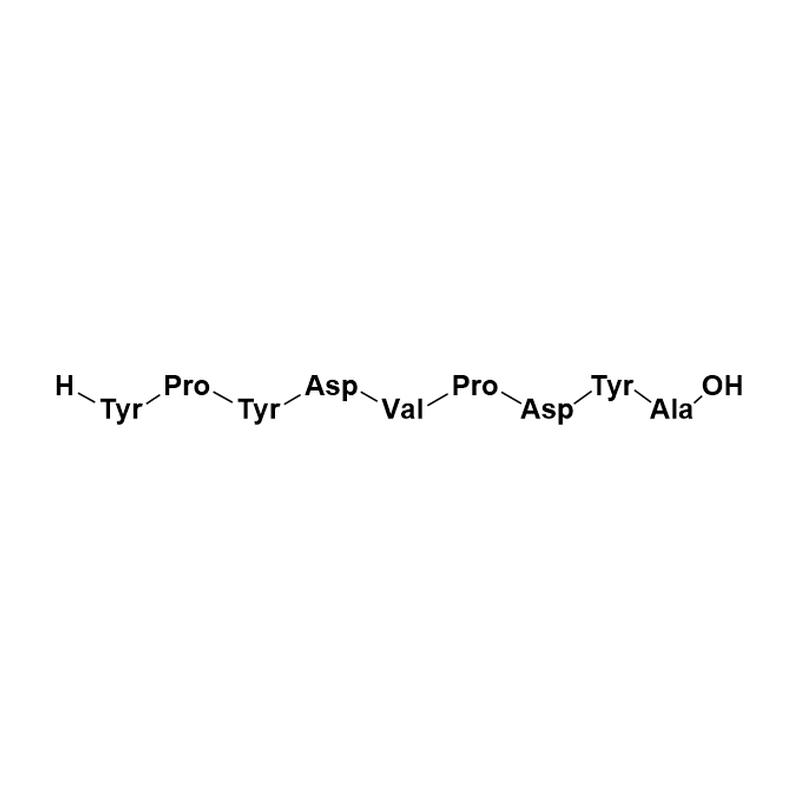产品
编 号:F520751
分子式:C53H67N9O17
分子量:1102.15
分子式:C53H67N9O17
分子量:1102.15
产品类型
规格
价格
是否有货
1mg
400
In-stock
5mg
792
In-stock
10mg
1320
In-stock
结构图

CAS No: 92000-76-5
产品详情
生物活性:
HA Peptide (HA tag) is a nine amino acids peptide derived from the human influenza hemagglutinin (HA). HA Peptide is extensively used to isolate, purify, detect, and track the protein of interest in cell biology and biochemistry.
体外研究:
HA Peptide is a highly immunoreactive tag generally used for the separation of tagged proteins from cell culture supernatants and cell lysate under neutral pH conditions and thus are handy tools for coimmunoprecipitation but are also easily detected via western blot. HA Peptide is small and thus unlikely to interfere with the bioactivity and function of the fusion partner proteins. HA Peptide comes from human influenza hemagglutinin (HA) corresponding to amino acids 98–106 and is a strong immunoreactive epitope making it popular to isolate, purify, detect, and track the protein of interest. The recombinant HA-tagged proteins can be separated by highly specific anti-HA monoclonal antibody that is covalently immobilized on resin. The HA-tagged proteins can be eluted by mild elution approach with HA epitope at 1?mg/mL in TBS. On the other hand, three chemical elution options are available: 0.1?M glycine (pH 2-2.8), 3?M NaSCN, or 50?mM NaOH. The nucleotide sequences encoding an N-terminal HA Peptide in the mammalian expression vectors is an essential element for the T7 promoter-driven expression in E. coli even without trans-acting T7 RNAP. Research results suggest that HA Peptide is cleaved by caspase 3/7, and HA Peptide cleavage results in a total loss of immunoreactivity. Observations indicate that the use of HA to tag proteins and constructs to study cell death–related and apoptotic mechanisms can result in serious artifacts.
HA Peptide (HA tag) is a nine amino acids peptide derived from the human influenza hemagglutinin (HA). HA Peptide is extensively used to isolate, purify, detect, and track the protein of interest in cell biology and biochemistry.
体外研究:
HA Peptide is a highly immunoreactive tag generally used for the separation of tagged proteins from cell culture supernatants and cell lysate under neutral pH conditions and thus are handy tools for coimmunoprecipitation but are also easily detected via western blot. HA Peptide is small and thus unlikely to interfere with the bioactivity and function of the fusion partner proteins. HA Peptide comes from human influenza hemagglutinin (HA) corresponding to amino acids 98–106 and is a strong immunoreactive epitope making it popular to isolate, purify, detect, and track the protein of interest. The recombinant HA-tagged proteins can be separated by highly specific anti-HA monoclonal antibody that is covalently immobilized on resin. The HA-tagged proteins can be eluted by mild elution approach with HA epitope at 1?mg/mL in TBS. On the other hand, three chemical elution options are available: 0.1?M glycine (pH 2-2.8), 3?M NaSCN, or 50?mM NaOH. The nucleotide sequences encoding an N-terminal HA Peptide in the mammalian expression vectors is an essential element for the T7 promoter-driven expression in E. coli even without trans-acting T7 RNAP. Research results suggest that HA Peptide is cleaved by caspase 3/7, and HA Peptide cleavage results in a total loss of immunoreactivity. Observations indicate that the use of HA to tag proteins and constructs to study cell death–related and apoptotic mechanisms can result in serious artifacts.
产品资料

